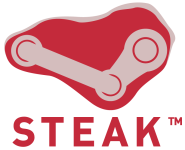NeoEdge Uncovered
Hot on the heels of Triton’s recent demise comes news of NeoEdge (thanks hahnchen), a distribution service promising a series of new twists on the Steam/Triton formula.
Its pitch is a delivery system based on a proprietary peer-to-peer technology, supported by an astonishing variety of advertisement models: in-game, pre-game, around-game, you name it. The result for NeoEdge Networks’ clients, across “casual”, “core” and “MMRPG” markets, is “free” distribution and a recurring, ad-based revenue stream.

Bioshock is present on the NeoEdge homepage. But are Irrational or Take2 actually distribution partners?
But what really makes you sit up and take notice of NeoEdge is the screenshot from Bioshock prominent on its front page (original URL).
I inquired about the image’s use and have yet to receive a reply, so take the association with a pinch of salt for now. But if Networks really is the digital distribution partner for Irrational Games’ upcoming sure-fire hit, we’re certain to be hearing a whole lot more about their service as the game nears its projected 2007 release.
In the meantime, we’ll delve a little deeper into exactly what NeoEdge Networks are trying to achieve with their service–and in fact what they are full stop.
NeoEdge’s Goals
Even without Bioshock, NeoEdge’s two-pronged model is an intriguing prospect. How will gamers respond to a service that uses their upload bandwidth to deliver content to other paying customers, and then pipes adverts to them?
Far more content can be delivered
Networks’ bet is that they will be placated by a knock-on effect from the advantages their system gives developers. Free distribution allows far more content to be delivered than is possible on centralised services like Steam, free content in particular, and recurring advertising revenue is offered (albeit probably after Networks take their cut), allowing prices to be driven down and providing steady income for ongoing development even if sales dip. The system’s users see the benefits of NeoEdge by way of the ‘more for less’ effect resulting from all this–at least in theory.
One issue that the system doesn’t solve is the inability of digital distribution to undercut retailers for signed games. The reduction in overhead NeoEdge aims for will need to be expressed to users if it is to become an established service rather than a despised one, but for signed titles, including Bioshock, the obvious method of price reduction is extremely unlikely to be available. There are plenty of alternatives (NeoEdge-exclusive content for one), but few avoid angering publishers and/or retailers in the same manner as undercutting.
“Morality”
No mater was Networks do however, there will always be those who aren’t prepared to put with advertising no matter what. With NeoEdge they might just be vindicated:
NeoEdge’s powerful reporting capabilities provide unsurpassed insight into how gamers use your games. Anonymous information about game playing and downloading patterns are gathered, aggregated and reported to game providers via easy web access. This information is gathered in a way that both respects the individual gamer’s privacy, yet provides valuable information to companies providing the games.
“Patterns are gathered, aggregated and reported”
NeoEdge’s advertising is “targeted”. Usage patterns are uploaded to Networks’ servers (as the above quote explains) for analysis by central client software, and adverts calculated to be appropriate are then downloaded and displayed. From the quote we are led to believe that only gameplay data that is uploaded, as with Steam and Half-Life 2: Episode One, but “downloading” could also be taken in the context of web browsing, the traditional target of malignant spyware and unquestionably a more fertile data source.
Networks certainly wouldn’t deny the charge of malignancy when confronted by Computerworld’s Dan Tennant a few months ago. But neither is it impossible that the data collection will be kept in-game: despite the recent “spyware” furore over Battlefield 2142, its monitoring software does not extend beyond gameplay (the actual text of the legal note that sparked the row can be read here).
Nevertheless, the mere presence of monitoring and uploads will undoubtedly be enough to put a subset of gamers off NeoEdge for good. Don’t expect too many NeoEdge-exclusive releases.
Networks’ Goals
Networks’ reasons for creating NeoEdge aren’t difficult to spot. “NeoEdge drives more ways to make money with your games than any other ad or delivery network” blares their corporate site’s front page; “More profit from new & past games”.
“Drives more ways to make money with your games”
Much like Vivendi, who migrated from shipping bottled water to shipping computer games, NeoEdge Networks–or Kinitos, Inc as it was formerly known–started out elsewhere. It was founded in 2002 to develop corporate software deployment systems, automating and aiding the roll-out process of new or upgraded applications over large networks. While I haven’t been able to dig up any reviews per se, their technology was enough of a success for Microsoft to extol it and its integration with their software (the .NET framework and Visual Studio) in a February 2005 joint press release (MS Word DOC).
Kinitos re-launched itself as NeoEdge on January 10 this year, with the same managerial staff and the same underlying technology but a new and more lucrative market. Indeed the press release tells us how “content providers can cash in” with the newly-registered company. Don’t mistake the move as a mad rush however: the group were owners of the neoedge.com domain as far back as 2003.
After all this, that managerial current managerial team consists of an entire one person with anything remotely like games industry experience, a “vice president of sales and channel marketing” from Atari, shouldn’t come as too much of a shock. “Chief Product Officer” and “Corporate Development” are the most common positions on each manager’s bio: in fact the only two vaguely hands-on looking staff listed are both mere “advisors”. At least the team come largely from AOL and not Thames Water.
Overall, it’s safe to say that NeoEdge is a good and proper capitalistic venture. Let’s just hope that gamers get something out of it too.




12 Responses to this post:
Comments
Tom Edwards Says:
Bonus image! 🙂 Click for full-size.
Andy Simpson Says:
It’ll be tricky to get people to use their upload bandwidth and advertise to them for things they’ve actually paid for, not matter how much.
Anyhow, a Steam client update, and once again, steamui_english.txt is the herald of upcoming changes. Guest passes for multiplayer games you can share with your friends, it seems.
Zagf Says:
“No mater was Networks do however, there will always be those who aren’t prepared to put with advertising no matter what.”
boglito Says:
I think neoedge may be perfect for distributing older titles for free with massive advertising. The success of tv-networks proves that people are accustomed to advertising, just not yet in games. Consider the game BloodRayne2, a game that passed its prime in a couple of weeks after launch (at least on the pc) and is now being offered for USD20 on steam. What if neoedge could offer the same game for free? To a lot of gamers ‘free’ sounds a lot better than ‘USD 20’, even if advertisements are a part of that free bundle. While the profits per game quite likely would not be USD20 as they are on steam the potential volume of “sales” is almost endless.
Sure, there are some people who will never accept advertising in games, but considering how few people there are that never accepts advertising in tv-shows and magazines I think that group is a very small, though probably very vocal, minority.
When it comes to bandwith I think some people would be happy to share some of their bandwith if they felt that had no adverse effect to themselves. I know I would happily donate bandwidth if I could (and I do everytime a major mod for HL2 is released cia bittorrent) since there is no backdraw to me as long as I can control it if I need to.
The BF2142 launch proves that it is possible to launch full-priced games with advertising integrated, so I would only be slightly suprised if we were to see tripple-A titles on neoedge with advertising. I do not believe we will see such games for a reduced price, though.
.bog.
Tom Edwards Says:
“Possible” has a slightly different meaning in this context. Obviously there isn’t anything preventing the physical manufacture of CDs with advertising code on them: it’s a question of the bad press you do or don’t get from it, and in EA’s case the degree to which it impacts sales.
Tom Edwards Says:
BTW, how do people feel about the pullout quotes I’ve started using? Do they look OK on your machine?
ATimson Says:
They look fine on mine. Firefox 2.0 for the win. 😉
boglito Says:
Well, I think the success of BF2142 is unquestionable. If people want the game they will buy it, no matter how much slightly more concious gamers are ranting about it on message-boards. Sure, _some_ may turn away (I know I have, for this, and other issues with EA), but not anywhere near the numbers needed to make in game advertising unprofitable.
The point is that in game advertising is only bad for games with small audiences. The big audiences, as a whole, do not really care one way or another.
.bog.
Tom Edwards Says:
Sorry about that folks. This post somehow became de-published. Unfortunately it showed up normally for me because I was logged in as an admin, so I only just noticed.
hahnchen Says:
I actually thought you took it down because one of the involved parties ushered you to. Note that the Neoedge page no longer involves Bioshock.
Tom Edwards Says:
http://www.2kgames.com/cultofrapture/qa1.htm
1 Trackbacks/Pings
NeoEdge now purely casual - The Steam Review